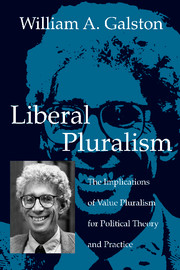Book contents
- Frontmatter
- Contents
- Acknowledgments
- LIBERAL PLURALISM
- I INTRODUCTION
- II FROM VALUE PLURALISM TO LIBERAL PLURALIST THEORY
- 2 Two Concepts of Liberalism
- 3 Three Sources of Liberal Pluralism
- 4 Liberal Pluralist Theory: Comprehensive, Not Political
- 5 From Value Pluralism to Liberal Pluralist Politics
- 6 Value Pluralism and Political Community
- III THE PRACTICE OF LIBERAL PLURALISM
- Index
2 - Two Concepts of Liberalism
Published online by Cambridge University Press: 20 March 2010
- Frontmatter
- Contents
- Acknowledgments
- LIBERAL PLURALISM
- I INTRODUCTION
- II FROM VALUE PLURALISM TO LIBERAL PLURALIST THEORY
- 2 Two Concepts of Liberalism
- 3 Three Sources of Liberal Pluralism
- 4 Liberal Pluralist Theory: Comprehensive, Not Political
- 5 From Value Pluralism to Liberal Pluralist Politics
- 6 Value Pluralism and Political Community
- III THE PRACTICE OF LIBERAL PLURALISM
- Index
Summary
THE CIVIC AND EXPRESSIVE DIMENSIONS OF LIBERALISM
Above and beyond artful institutional contrivances, liberal democracies rely on cultural and moral conditions that cannot be taken for granted. But to remain “liberal,” these regimes must safeguard a sphere in which individuals and groups can act, without state interference, in ways that reflect their understanding of what gives meaning and value to their lives. What is the relationship between the “civic” and the “expressive” strands of liberalism? What should we do when state action designed to bolster the preconditions of liberal democracy constrains expressive liberty in troubling ways, or conversely, when the exercise of expressive liberty is at odds with what may be regarded as liberal democratic preconditions? This conflict inevitably arises in public institutions, such as schools. But it also emerges when the state seeks to regulate the structure and conduct of voluntary associations.
Must civil associations mirror the constitutional order if they are to sustain that order? The resolution of this issue revolves in part around empirical questions: For example, to what extent do illiberal or undemocratic voluntary associations engender patterns of conduct, belief, and character that weaken liberal democratic polities? There is no agreement among scholars on this point, certainly not in general, and rarely in specific cases. Theorists such as Stephen Macedo are right to emphasize the dangers of complacency. Liberal democratic citizens are made, not born, and we cannot blithely rely on the invisible hand of civil society to carry out civic paideia.
- Type
- Chapter
- Information
- Liberal PluralismThe Implications of Value Pluralism for Political Theory and Practice, pp. 15 - 27Publisher: Cambridge University PressPrint publication year: 2002
- 1
- Cited by



